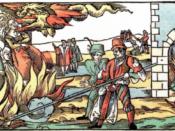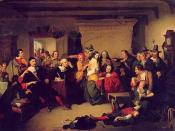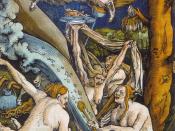Supernatural beliefs and belief in witchcraft were popular during the early modern period. To consider the rationality of these beliefs necessitates that we consider them in the context of the period. To impose our modern ideas of rationality and reason upon the beliefs of this period takes them totally out of context and renders them irrelevant and possibly even ridiculous. When we study them within the period we can see the beliefs as part of the structure of society and being affected by cultural, religious and political factors, this in turn gives us a good basis on which to judge their rationality.
Probably the most widespread of all beliefs that could be considered supernatural is astrology. This was taken quite seriously and whereas today we will look at our horoscopes for entertainment, major decisions such as Elizabeth I coronation were made after consultation with astrological advisors. This illustrates the fact that this cannot be disregarded as merely a lower class method of entertainment nor can it be attributed to ignorance on behalf of the believers.
As literacy increased and printing became more popular so did astrology, Almanacs were very popular, reaching a large amount of people. In the seventeenth century approximately five million almanacs were sold, even people who were not literate may have had them read to them, so we can see there was a large audience for this popular method of astrology.
The rationality of these almanacs and the use of astrology were based on the scientific knowledge of the time. The belief about the body was that it consisted of four humours and in order for the person to remain healthy they had to keep these humours in good balance, each humour; Blood, phlegm, Black bile and yellow bile related in different ways to the planets...



Useful
A solid piece of writing that adressess the question and gives a defined answer. Excellent piece of work.
1 out of 1 people found this comment useful.